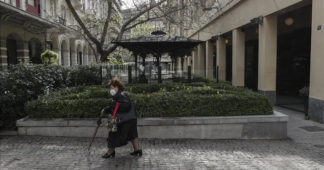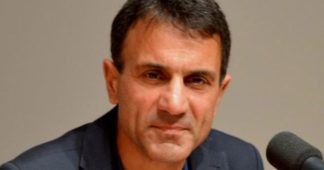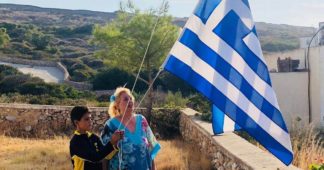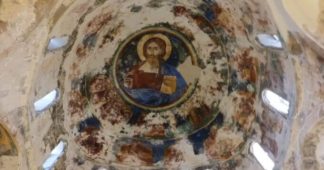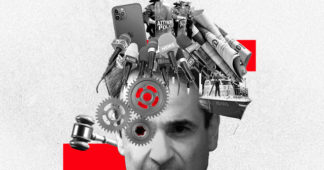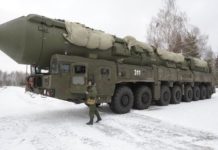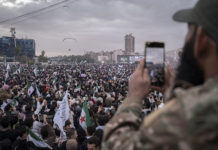I have been studying Greek history for a very long time. In fact, I learned ancient and medieval Greek history at the University of Illinois and received a doctorate in modern Greek and European history at the University of Wisconsin. I wrote my dissertation on Adamantios Koraes whom I consider the father of the Greek Revolution of 1821. Koraes working from Paris, kept reminding the Greeks under Turkish occupation in the early 19th century that they were the children of the ancient Greeks whose civilization had created the modern world. This inspired them to throw the Turks out of their country and, eventually, become independent and free.
Beginnings
In 1828, the European great powers, Russia, France, and England sent Ioannes Kapodistrias to Greece as the first President of the country. Kapodistrias was an outstanding diplomat, perhaps the best in Europe. He worked for the Tzar of Russia. He was responsible for the independence and neutrality of Switzerland. He also prevented the dismemberment of France after the defeat of Napoleon in 1815. From 1816 to 1822, he was the Foreign Minister of Russia. But in addition to his understanding of the Europeans, Kapodistrias was a Greek patriot that tried to create a Greek state independent of local parties and foreign influence. He organized the Greek army, expanded and settled the borders of the new country, and otherwise set the foundations for the rule of law and the betterment of life of all the people of Greece. This displeased the few Greek landowners and foreign powers, especially England and France, which funded his assassination on September 27, 1831.
Foreign influence
The killing of Kapodistrias darkened modern Greek history. The European powers installed a German king to govern the country, thus doing away with democracy in Greece and the political independence of the country. Instead of building up the strength of Greece, the emerging Greek politicians, schooled in the ways of Europe and America, took the easy and profitable way of becoming the lobbyists of foreign governments. They still are – in 2024. They are responsible for the perpetual decline of the country.
This political crisis became acute during the Obama administration. The American financial tsunami of 2008 sent seismic signs to Greece. The Greek Statistical Authority came under the control of a man from the International Monetary Fund, an agency of the Department of the Treasury of the United States. This man manipulated Greek statistics and raised the country’s deficit from 6 to 12.5 percent of the GDP. This fraud had serious consequences. In 2009, Prime Minister George Papandreou dumped Greece to the Troika: European Union, European Central Bank, and America’s International Monetary Fund, supposedly to fix the finances of the country. This turned out to be a hostile act. It put foreigners on the wheels of the Greek state. The country has been under European and American bureaucratic occupation ever since. The bureaucrats of the EU-IMF used the money Greece borrowed from them not to invest in Greece but to save bankrupt German, French and American banks. Greece was put on a diet of austerity that resembled the German occupation of Greece, April 1941- October 1944. Moreover, the foreign debt rulers started selling off the assets of Greece: airports and telephones to Germany, the harbor of Piraeus to China, railroads to Italy. Cowboy capitalism impoverished town and village alike. And despite the 30,000,000 tourists who visit Greece every year, spending billions in the country, the Greek government is by no means supportive of Greek manufacturing, even selling off to foreigners its defense industry.
However, there may be rays of hope in the reorganization of the defense industry.
“Greece’s re-armament program,” says the Greek reporter Spyridon Plakoudas, “which may exceed 11.5. billion euros by 2025, will offer its defense industries new contracts with the Ministry of Defense. In fact, local defense companies have supplied the Greek military with made-in-Greece weaponry such as drones and speedboats in growing numbers from late 2020 onwards – a trend that will only be reinforced in the near future. This program also will involve allied states with established defense industries – most notably, Israel, France, the UAE, and the U.S. Either as investors… or as partners in the co-production of key weapons such as new frigates… in [Greek] Shipyards, these countries can act as a force multiplier for the still-nascent Greek defense industry.”
The enemy next door
The enemy next door, Turkey, is watching. With 40,000 soldiers on northern Cyprus, Turkey’s appetite is expanding for the capture of the rest of Cyprus and possibly Greece. Turkey is building up its navy, a policy disturbing its neighbors, Israel and Greece. Turkey refuses to even recognize the Democratic Republic of Cyprus, a member of the United Nations and European Union. And neither the government of Athens or Leukosia have complained to the EU or the United Nations or taken Turkey to the International Court of Justice for Turkey’s genocidal policies against the Greeks of the occupied territory of Cyprus. For 50 years the Turks have committed war crimes, cleansing, rapes, killings, and genocide in northern Cyprus. The incomprehensive reluctance of Greece and Greek Cyprus to face the truth of what Turkey is and what it plans to do, emboldens Turkey. They should have a strategy to free Cyprus of the Turkish menace and be ready to fight and defeat Turkey.
America’s fear of Russia and Turkey
Erdogan cares less about NATO, to which the US recruited Turkey and Greece in the 1950s. Erdogan, however, understands America’s fear of Russia. Like other Turkish leaders before him, he must have told American policy makers Turkey will stay at NATO as long as America gives him all that he asks: money, advanced military technologies, and Greek territory. After all, Turkey invaded Cyprus in 1974 only after President Lyndon Johnson in 1964 ordered Greece to withdraw its army from Cyprus. And as if the US wanted to reward Turkey for staying in NATO, in 1959, it moved 50 nuclear bombs to the Incirlik Turkish air force base.
This American-Turkish connection freezes the leaders of Greece who have already gone through the humiliations of the debt during the Obama administration. They are already the lobbyists of foreign powers and face the rapidly growing military power of Turkey. They are afraid to go to China and India, for example, to ask those countries to assist them strengthening the military power of Greece to match and exceed that of Turkey, which America will not do because of NATO and concerns and fear of Turkey.
American policy makers must feel terrified about the fate of their nuclear bombs in a Turkish air force base. Can they take the weapons out of Turkey? This is a Moslem country of long-standing policies of genocide and atrocities, with ambitions of empire. What will the Turks do if they suspect Americans may remove the bombs? Will they capture the weapons and kill the American soldiers guarding them? Such a prospect will spark a major war between America and Turkey with certain catastrophic consequences for Turkey and the Aegean and the Mediterranean. No one is talking about this Gordian Knot that President Dwight Eisenhauer tied during the intense fear of annihilation of the Cold War, in 1959. There’s no doubt, the US should bring those weapons back home.
Turkey and Greece
However, in 2024, Turkey is acting like a superpower. It is fighting the Kurds in Turkey, Iraq and Syria. NATO remains silent to the Turkish genocide against the Kurds and against the Greeks in northern Cyprus. And the government of Greece is also silent about this and other Turkish threats, particularly Turkey’s push toward the Greek Aegean islands. “Turkey,” said Greek reporters, “claimed to be “suffocating” by the proximity to its shores of the Eastern Aegean islands and the Dodecanese under Greek sovereignty… Turkish strategy toward Greece has focused on “breaking the encirclement” and laying claim to half of the Aegean Sea. The “Blue Homeland” is projected as a springboard for geopolitical claims and has quickly become extremely popular among the ranks of the Turkish Armed Forces…. With the “Blue Homeland” we now have a complete picture of Turkish claims. It is a nationalist, revisionist and aggressive ideology. A ticking time bomb… As has happened in the past with the neighboring country’s claims, if we let them mature, they will be magnified, giving Turkey the confidence to create illegal faits accomplis, like the Turkish-Libyan pact.”
In fact, Turkish officials and Erdogan are already saying that the Greek islands in the Aegean belong to them. Turkey is teaching its elementary school children that the “blue homeland” (the Aegean Sea) is theirs. Greece remains silent to these provocations risking her sovereignty. The Turks interpret Greek silence to acceptance of their virulent ideology. Turkey then demands more of Greece. Neither NATO, nor the UN, nor the EU, nor the US are protesting and challenging these deadly Turkish threats preparing the ground for war against Greece.
Greek assets
Rather than playing the game of cat and mouse with the enemy next door, Greece can transform herself to her ancient traditions of courage and freedom and knowledge that would make the country invincible. Keep developing the defense industry at home and collaborate with Israel, France and other countries that can increase Greek skills and technologies beneficial to national defense. If Erdogan dares to attack any of the Greek islands, Greece and Cyprus must be ready to fight and win over Turkey.
At the same time light up a Renaissance to prepare the Greek people to understand who they are. Punish or ostracize those Greeks who hate Greece. Shut down or severely restrict the political activities of Greeks who are foreign lobbyists. Read the books of your ancestors in the schools. Teach ancient Greek to all Greek students from preschool to college. Teach them also Greek mythology, poetry, literature, philosophy, history, and science. Use the money from tourism to improve Greek archaeology, and the explanations tourists must have to appreciate what they see in the museums and archaeological sites. Tourists are potential Philhellenes. They could become a tremendous asset for the defense of Greece. They are potential Greek ambassadors in their countries.
Help to reverse the industrialization of Greek agriculture. Help peasants to keep producing food in their villages. Stop the interaction with the EU programs of homogenization of the countryside. Greek culture and climate change and good food demand the end of the use of toxic pesticides, synthetic fertilizers, the use of large tractors and other petroleum-burning machines. Replace all these ecocidal technologies with domesticated bulls, horses, mules, and donkeys.
Become the school of Europe and the cultural capital of the world. Educate the millions of tourists visiting the country about those who built ancient Greece, particularly the founders of civilization: those who like Euclid and Archimedes created mathematics and Homer who wrote the beautiful and immortal epics of the Iliad and the Odyssey. Teach students, non-students, tourists about Aristotle who invented science and taught Alexander the Great.
Such a Renaissance takes time. The Arabs created their culture in the 8th to 10th centuries from studying translated copies of Greek philosophical and scientific works. They nearly worshipped Aristotle whom they called The Philosopher. The Europeans did the same thing in the 15th and 16th centuries. Modern Greeks must follow up with the ideas of their ancestors now, in 2024 and several years after. Such an acquaintance with Homer, Hesiod, Pythagoras, the tragic poets (Aeschylus, Sophocles, Euripides), Aristophanes, Plato, Aristotle, Alexander the Great, Euclid, Archimedes, Hipparchos, Plutarch, Ptolemaios, and Galen will make Greece the superpower it has always been.
In a Greece of light, Turkey, if it exists at all, will pose no threat. Like other neighboring countries, it will be seeking enlightenment rather than war. Hector died at the hands of Achilles.
We remind our readers that publication of articles on our site does not mean that we agree with what is written. Our policy is to publish anything which we consider of interest, so as to assist our readers in forming their opinions. Sometimes we even publish articles with which we totally disagree, since we believe it is important for our readers to be informed on as wide a spectrum of views as possible.
